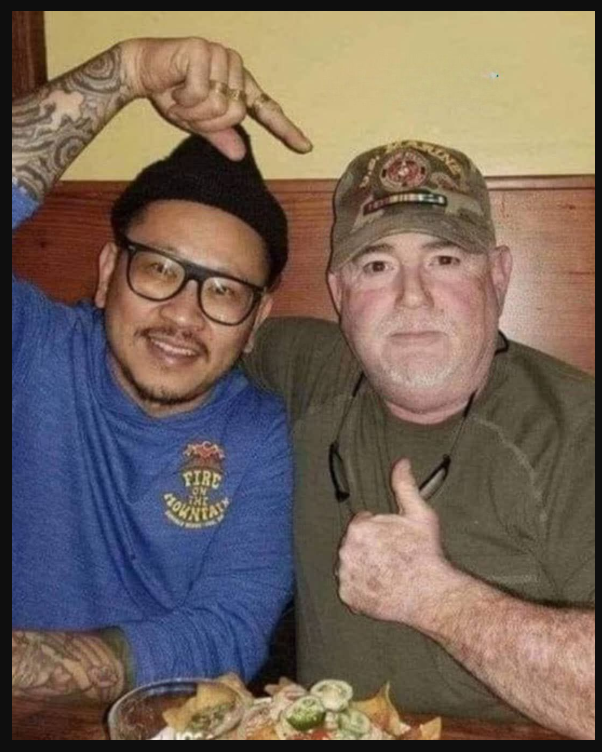John has visited my office for years. Same order, quiet nod. One of those guys you don’t think twice about—until you do. Last week, I told him my girlfriend and I were going to Vietnam. Just talking. His face transformed completely. “I was there,” he said. “Fall of Saigon. Orphaned kids were loaded aboard flights to save as many as possible.” My stomach sank. I was a baby. I told him. Watched his hands stop on the counter. His eyes welled. “Then I might’ve held you,” he muttered. Nobody talked for a moment. The hands that saved me always puzzled me. Those who got me out. One was now standing in front of me.
We talked for a while. He recalled the turmoil and anguish of that day. His voice was thick, and he clutched my shoulder before leaving. “I’ll sleep better tonight,” he said. “Knowing you made it.” I thought it was over—a beautiful, unbelievable moment. But then he paused before walking away. “There’s… something else,” he said, lowering his voice. “Something I should say.” Then everything changed. John sat back, massaging his hands like he was summoning the bravery to speak something buried for decades. He sharply exhaled and looked at me. “I had a child there. In Saigon.” My chest tightened. “You had a child?” He nodded.
“Linh. A woman I met while stationed there. We fell in love despite everything. We had a son before I fully realized what was happening.” His voice cracked. “I tried to leave with them, but I couldn’t. I lost them when the city fell. I searched and asked everyone I could, but they vanished.” I stayed silent, listening, trying to absorb it all. “I’ve never stopped looking,” he said. “I never gave up trying to find them. But there were no records, nothing to trace. Just a name, a memory, and a photo.” He pulled out a yellowed, faded picture from his wallet—John as a young man, holding a baby beside a kind-looking woman with deep black eyes. “I don’t know if he made it out. Or if Linh did. I just… if I could know they’re okay, that would mean everything.” Something tugged at my heart. Something deeper than coincidence. Greater than a random meeting between a veteran and an adoptee. The baby in the photo caught my eye. Then I looked at John. My mind raced. “John,” I whispered. “What if I helped?” He blinked at me.
“You mean… what?” “I’m going to Vietnam,” I said. “I know people who specialize in locating lost relatives. I can bring that photo, and any details you remember.” His breath caught. “You’d do that?” I nodded. “Yeah. I would.” He cried. And for the first time since I’d known him, he looked hopeful. We spent over an hour going through everything he could remember. The district where Linh lived. The hospital where their son was born. How she braided her hair. Writing it all down felt like recording his hope. After I arrived in Ho Chi Minh City, I visited an old archival contact. I shared the photo and the story. She agreed to help. She scanned the image and passed it along to researchers and wartime family tracers. Days passed. A week. Then two. One evening, I got a call. “We found someone.” My heart jumped into my throat. The investigator gave me an address.
“It’s not confirmed,” she said. “But Bao is a man. Linh was his mother. She often spoke of an American soldier who tried to take them with him before everything collapsed.” I went immediately. My hands trembled as I knocked on the door. A man in his late 40s answered. He had his mother’s eyes. And somehow… John’s jawline. I swallowed hard. “Bao?” He looked at me cautiously. “Who are you?” I took out the photo. “I think this is your father.” His face went pale. He stared at the picture for what felt like forever. Then reached for it with shaking hands. “I’ve never seen this before,” he said softly. “My mother didn’t have any photos of him. But she used to say he loved us. That he tried.” “She was right,” I whispered. “He never stopped looking for you.” What happened next moved quickly. I called John. His voice was gruff. “Any news?” “I think I found him.” Silence. Then a shaky breath. “You sure?” “Come see.” A week later, John stepped off a plane in Vietnam looking more nervous than I’d ever seen him. Bao hesitated when he saw him—then recognition hit. He walked slowly, then faster, until they stood inches apart. And then John did what he’d waited nearly 50 years to do. He wrapped his arms around his son. The dam burst. Bao cried into his shoulder like a boy. And John—this strong, silent man I’d known for years—wept with him. Later, over coffee, they talked, swapped memories, asked questions. Laughed. I cried again. Bao gave John a photo of Linh, who had passed away years ago. John gently touched her face, like it was sacred. “I never stopped loving her,” he said. When I left Vietnam, they were already planning their first father-son trip to America. A lifetime they missed, now beginning again. And I? I witnessed something I’ll never forget. A man finding his family. A father holding his son. A story restored. It reminded me that sometimes, life brings us back to where we belong.
